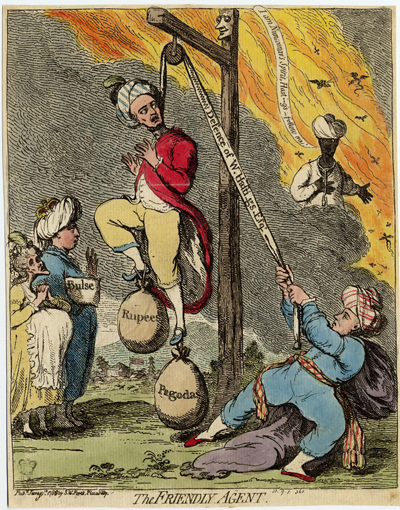The Friendly Agent
The agent in question here is Major John Scott-Waring, a long-time associate of the former Governor General of Bengal, Warren Hastings. When Hastings began to be attacked by the Whigs in Parliament (led by Edmund Burke) for a number of actions he took while managing (or mismanaging as Burke and the Whigs would argue) the affairs of the East India Company, Major Scott was sent to England to take up Hastings' defence. According to Robin Reilly in his book, William Pitt the Younger,
No choice could have been less suitable. Scott combined, in immoderate proportions, unquestioning devotion with misplaced activity. . . . The provison of a parliamentary seat supplied him with some social standing, but it gave him also a forum for his ill-digested opinions, and an opportunity to display his unrivalled capacity for injudicious statement and ill-timed intervention. (p. 184)

© Trustees of the British Museum
Scott is shown demonstating this kind of ineptitude, by hanging Hastings with his own Defense. According to Wikipedia, in addition to hanging felons, gallows were "widely used to suspend public weighing scales for large and heavy objects such as sacks of grain or minerals," so Hastings is shown as a kind of human scale weighted down with the rupees and pagodas he was rumored to have offered as bribes. Not surprisingly, an image of Burke looks on with satisfaction at this result from the top of the gallows. Meanwhile, unlike Queen Charlotte, the King observes the scene impassively, no doubt trying, as he did in fact, to appear impartial. But he carries under his arm a "Bulse" which Merriam-Webster defines as "a purse or bag in which to carry or measure valuables (such as diamonds or gold dust)" implying (falsely) that he has already been paid off.
One of the charges brought against Hastings at this time involved Maharaja Nandakumar (sometimes called Nuncomar), a former tax collector in West Bengal, who had replaced Hastings in that position, and was in turn replaced by Hastings when Hastings was reinstated. Nandakumar accused Hastings of giving and receiving bribes and claimed to have documents proving the assertion. Hastings accused Nandakamur of forgery. The case against Nandakamur was tried before Elijah Impey, the Chief Justice of the Supreme Court in Calcutta, and perhaps not coincidentally a school friend of Hastings. The Maharaja was found guilty and subsequently hanged, the first native Indian to be executed in that fashion. Burke and Hasting's arch-enemy, Sir Philip Francis, considered it a judicial murder.
In The Friendly Agent, Nandakamur is shown standing amid the flames of Hell with the noose still around his neck, beckoning to Hastings: "I am Nuncomar's Spirit, Hast**gs - follow me!" Had Hastings been found guilty on all the charges brought against him, he might have followed Nandakamur. But after an agonizing and financially ruinous trial lasting until 1795, Hastings was finally acquitted.
Sources and Reading
- Commentary from the British Museum on The Friendly Agent.
- "John Scott-Waring," Wikipedia
- "George III," Wikipedia
- "Charlotte of Mecklenburg-Strelitz," Wikipedia
- "Warren Hastings," Wikipedia
- "Impeachment of Warren Hastings," Wikipedia
- "Maharaja Nandakumar," Wikipedia
- Robin Reilly, William Pitt the Younger, New York, 1979 Ch, 13, "The Trials of Warren Hastings"
- "Gallows," Wikipedia
Comments & Corrections
NOTE: Comments and/or corrections are always appreciated. To make that easier, I have included a form below that you can use. I promise never to share any of the info provided without your express permission.